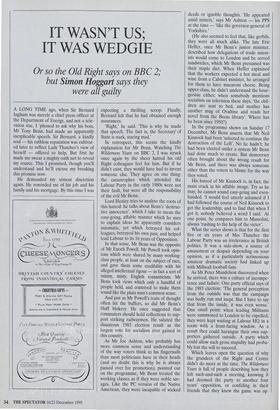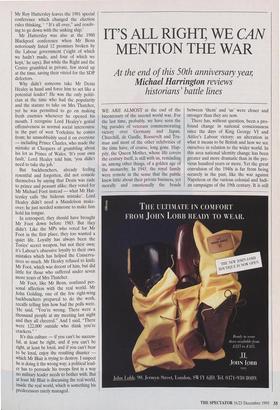IT WASN'T US; IT WAS WEDGIE
Or so the Old Right says on BBC 2; but Simon Hoggart says they were all guilty A LONG TIME ago, when Sir Bernard Ingham was merely a chief press officer at the Department of Energy, and not a tele- vision star, I 'phoned to ask why his boss, Mr Tony Benn, had made an apparently inexplicable speech. Sir Bernard, a kindly soul — his ruthless reputation was cultivat- ed later to reflect Lady Thatcher's view of herself — offered to help. But first he made me swear a mighty oath not to reveal my source. This I promised, though you'll understand and he'll excuse my breaking this promise now.
He demanded my utmost discretion again. He reminded me of his job and his family and his mortgage. By this time I was expecting a thrilling scoop. Finally, Bernard felt that he had obtained enough assurances.
`Right,' he said. 'This is why he made that speech. The fact is, the Secretary' of State is stark, staring mad.'
In retrospect, this seems the kindly explanation for Mr Benn. Watching The Wilderness Years on BBC 2, I was struck once again by the sheer hatred his old Right colleagues feel for him. But if he didn't exist, they would have had to invent someone else. They agree on one thing: the catastrophes which attended the Labour Party in the early 1980s were not their fault, but were all the responsibility of the evil Mr Benn.
Lord Healey tries to analyse the roots of this hatred: he talks about Benn's 'destruc- tive innocence', which I take to mean the easy-going, affable manner which he uses to explain ideas he apparently considers axiomatic, yet which betrayed his col- leagues, betrayed his own past, and helped lead Labour to its 16 years of Opposition.
In that sense, Mr Benn was the opposite of Mr Enoch Powell. Mr Powell took opin- ions which were shared by many working- class people, at least on the subject of race, and gave them some credibility with his alleged intellectual rigour — in fact a sort of mimsy, misty, English romanticism. Mr Benn took views which only a handful of people held, and contrived to make them sound like the plain man's common sense.
And just as Mr Powell's train of thought often hit the buffers, so did Mr Benn's bluff blokery. He once suggested that commuters should hold collections to sup- port striking railwaymen. He saluted the disastrous 1983 election result as the largest vote for socialism ever gained in this country.
As Mr Joe Ashton, who probably has more common sense and understanding of the way voters think in his fingernails than most politicians have in their heads (and no doubt this is why he is always passed over for promotion), pointed out on the programme, Mr Benn treated the working classes as if they were noble sav- ages. Like the PC version of the Native American, they were incapable of wicked deeds or ignoble thoughts. 'He appeared amid miners,' says Mr Ashton — his PPS at the time — 'like the governor-general of Yorkshire.'
(He also seemed to feel that, like gerbils, they were all much alike. The late Eric Heifer, once Mr Benn's junior minister, described how delegations of trade union- ists would come to London and be served sandwiches, which Mr Benn presumed was their staple diet. When Heifer explained that the workers expected a hot meal and wine from a Cabinet minister, he arranged for them to have macaroni cheese. Being upper-class, he didn't understand the bour- geoisie either; when somebody mentions socialism on television these days, 'the chil- dren are sent to bed, and mother has another mug of Ovaltine and reads her novel from the Boots library'. Where has he been since 1950?) In the programme shown on Sunday 17 December, Mr Benn asserts that Mr Neil Kinnock had been 'selected to continue the destruction of the Left'. No he hadn't; he had been elected under a system Mr Benn had done much to create. But democracy often brought about the wrong result for Mr Benn, and there was always someone other than the voters to blame for the way they voted.
His hatred of Mr Kinnock is, in fact, the main crack in his affable image. Try as he may, he cannot sound easy-going and even- handed. 'I would feel utterly ashamed if I had followed the course of Neil Kinnock to get the leadership, and to find that when I got it, nobody believed a word I said.' At one point, he compares him to Mussolini, always 'rushing to the help of the victor'.
What the series shows is that for the first five or six years of Mrs Thatcher the Labour Party was an irrelevance in British politics. It was a side-show, a source of amusement or despair depending on your opinion, as if a particularly acrimonious amateur dramatic society had linked up with Millwall football fans.
As Mr Peter Mandelson discovered when he arrived, there was a culture of incompe- tence and failure. One party official says of the 1983 election: 'The general perception from the outside was that the campaign was badly run and inept. But I have to say that from the inside, it was even worse.' One small point: when leading Militants were summoned to London to be expelled, they were kept waiting at Labour HQ in a room with a front-facing window. As a result they could harangue their own sup- porters gathered outside. A party which could allow such gross stupidity had proba- bly lost the will to succeed.
Which leaves open the question of why the grandees of the Right and Centre didn't do more at the time. The Wilderness Years is full of people describing how they left such-and-such a meeting, knowing it had doomed the party to another four years' opposition, or confiding in their friends that they knew the game was up. Mr Roy Hattersley leaves the 1981 special conference which changed the election rules thinking, " It's all over," and resolv- ing to go down with the sinking ship.'
Mr _Hattersley was also at the 1980 Blackpool conference when Mr Benn notoriously listed 12 promises broken by the Labour government (`eight of which we hadn't made, and four of which we kept,' he says). But while the Right and the Centre grumbled in private, few stood up at the time, saving their vitriol for the SDP defectors.
Why didn't someone take Mr Denis Healey in hand and force him to act like a potential leader? He was the only politi- cian at the time who had the popularity and the stature to take on Mrs Thatcher, yet he was permitted to go on making fresh enemies whenever he opened his mouth. I recognise Lord Healey's genial offensiveness as normal social intercourse in the part of west Yorkshire he comes from; he unsnobbishly used it on everyone — including Prince Charles, who made the mistake at Chequers of grumbling about his lot as Prince of Wales. 'It's your own fault,' Lord Healey told him, 'you didn't need to take the job.' But backbenchers, already feeling resentful and forgotten, did not console themselves by saying that Denis was rude to prince and peasant alike; they voted for Mr Michael Foot instead — what Mr Hat- tersley calls 'the hideous mistake'. Lord Healey didn't need a Mandelson make- over; he just needed someone to make him hold his tongue.
In retrospect, they should have brought Mr Foot down before 1983. But they didn't. Like the MPs who voted for Mr Foot in the first place, they too wanted a quiet life. Loyalty has always been the Tories' secret weapon, but not their own; it's Labour's obsessive loyalty to their own mistakes which has helped the Conserva- tives so much. Mr Healey refused to knife Mr Foot, which was decent of him, but did little for those who suffered under seven more years of Mrs Thatcher. Mr Foot, like Mr Benn, confused per- sonal affection with the real world. Mr John Golding, one of the few right-wing backbenchers prepared to do the work, recalls telling him how bad the polls were. `He said, "You're wrong. There were a thousand people at my meeting last night and they all cheered." And I said, "There were 122,000 outside who think you're crackers." ' It's this culture — if you can't be success- ful, at least be right, and if you can't be right, at least be loyal, and if you can't bear to be loyal, enjoy the resulting disaster — which Mr Blair is trying to destroy. I suspect he is doing it the wrong way; a political lead- er has to persuade his troops first in a way no military leader needs to bother with. But at least Mr Blair is discussing the real world, inside the real world, which is something his predecessors rarely managed.











































































































 Previous page
Previous page